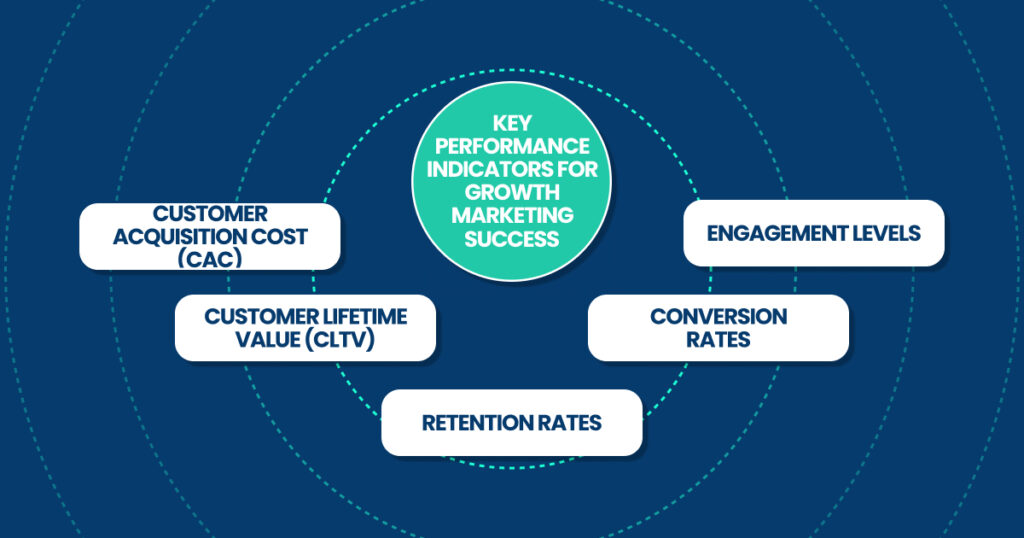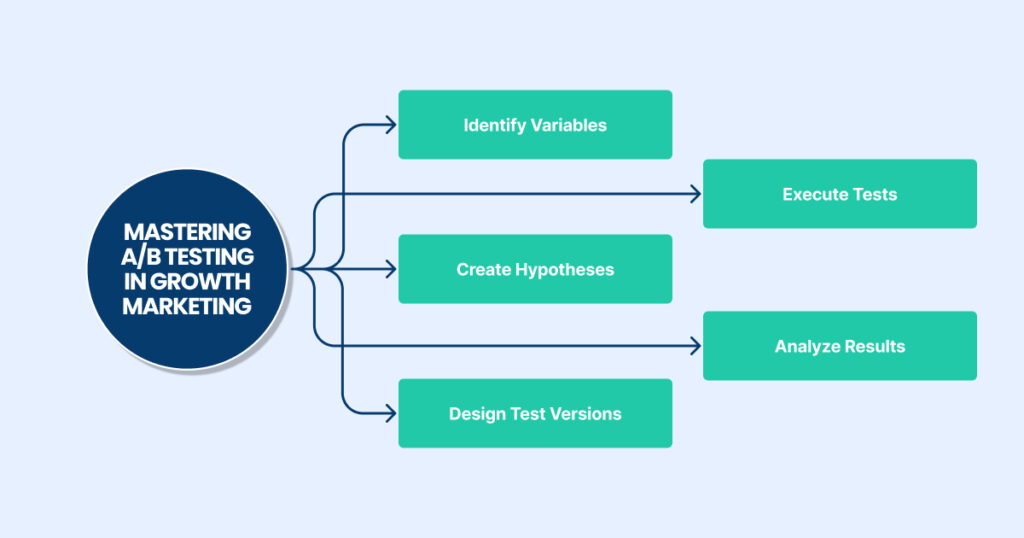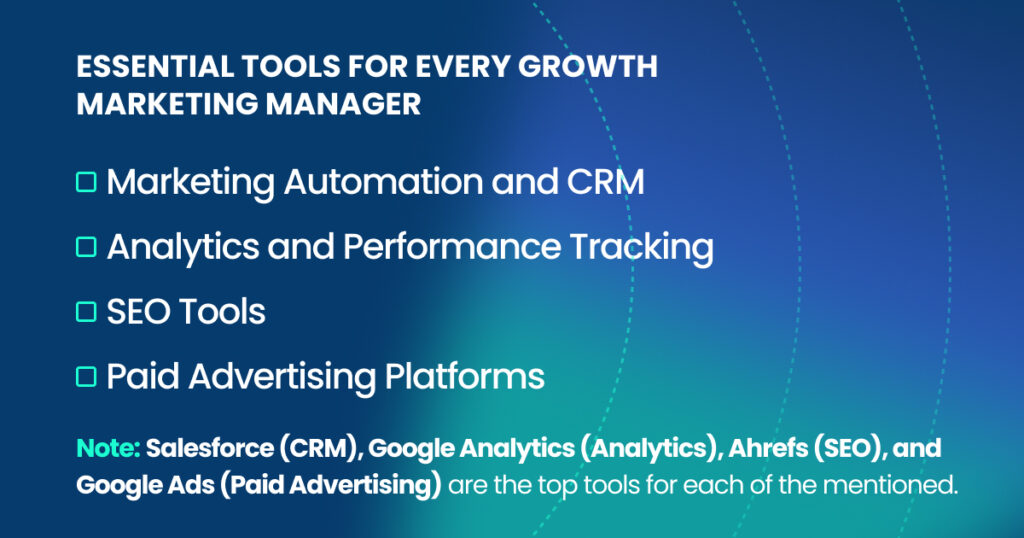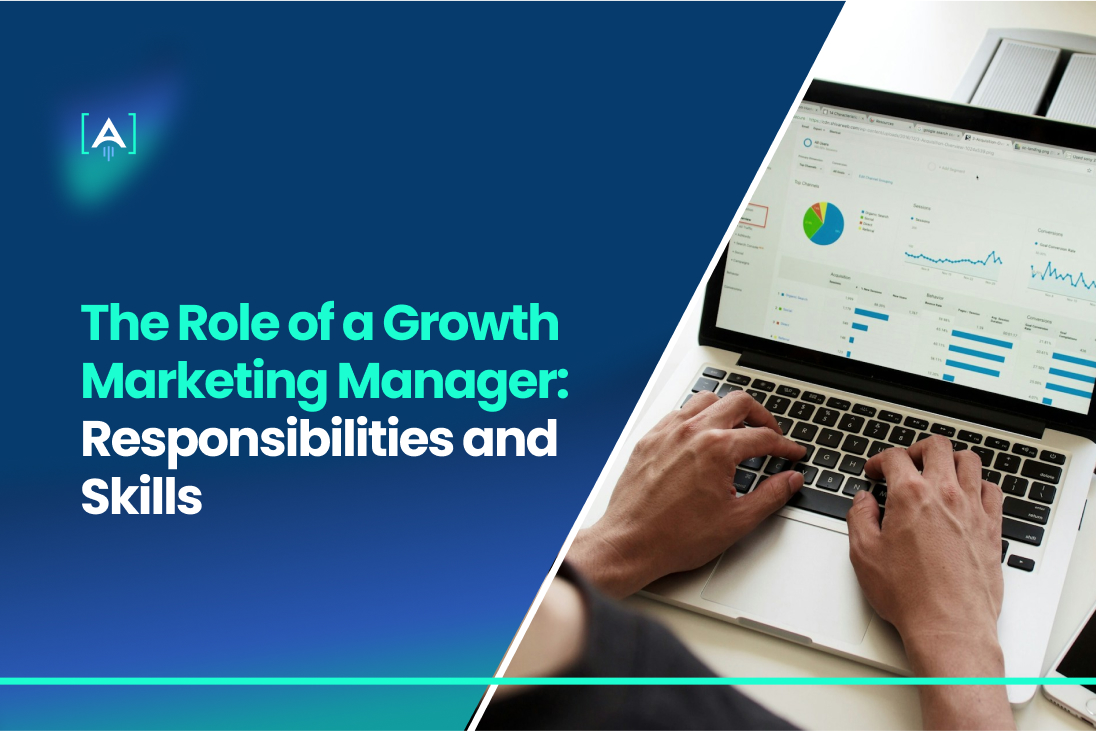
Source: HubSpot
Growth marketing management represents a dynamic evolution in the field of marketing, focusing on strategies that drive growth.
A growth marketing agency is pivotal in implementing growth marketing strategies that capitalize on rapid market changes and emerging trends.
Within a growth marketing agency, a Growth Marketing Manager oversees strategy execution, focusing on optimizing the full funnel from awareness to loyalty.
On the other hand, a Growth Marketing Consultant provides specialized insights and advisory services, leveraging their expertise to fine-tune strategies and maximize growth potential for startups and established businesses. Let’s not confuse these two roles.
The blog post will detail the role of a Growth Marketing Manager, including their responsibilities and skills, as well as insights on growth marketing manager salary, their instrumental role in supporting startups, and strategies for optimizing growth trajectories.
Core Responsibilities of a Growth Marketing Manager
A growth marketing manager holds a pivotal role within an organization. They are dedicated to identifying new opportunities for business expansion and ensuring the practical implementation of personalized marketing and proven strategies across various channels.
This multifaceted position involves strategic planning, analytical assessment, and hands-on marketing execution, aiming to drive sustainable business growth.
How Much is a Growth Marketing Manager Salary?
When considering a growth marketing manager career, understanding the financial landscape is essential.
The average growth marketing manager salary in the USA is approximately $115,000 per year, translating to about $55.29 per hour.
Entry-level positions typically start at around $95,000 annually, while seasoned professionals can earn up to $155,850 per year.
Negotiating a growth marketing manager salary often hinges on factors such as industry experience, geographical location, and the specific scope of responsibilities within the role.
Employers recognize the value of these professionals in navigating complex market dynamics and optimizing ROI across diverse marketing channels.
As businesses increasingly prioritize digital transformation and customer engagement, the role of the growth marketing manager continues to evolve, with salary expectations reflecting the strategic impact these professionals have on organizational success.
Strategic Planning and Execution
The foundation of a growth marketing manager’s responsibilities lies in their ability to develop and refine growth marketing solutions. These solutions are about increasing visibility or traffic and are focused on generating measurable growth through carefully planned and executed initiatives.
A growth marketing manager begins by thoroughly analyzing the market, competition, and customer behavior to identify potential growth opportunities. This includes understanding where the product or service fits within the market and how it can be positioned to capitalize on these opportunities.
Developing a growth-focused marketing strategy involves setting clear, actionable goals and defining the metrics that will be used to measure success. This strategic framework guides all marketing efforts and ensures that every tactic aligns with the overarching business objectives.
For instance, if the goal is to enhance customer acquisition, the growth marketing manager might focus on optimizing conversion paths, enhancing lead quality, and expanding reach through new channels.
Developing Growth-Focused Marketing Strategies
In today’s rapidly evolving digital landscape, a growth marketing manager must leverage advanced tools and techniques to stay ahead. AI marketing tools, for example, are increasingly used to predict customer behavior, personalize marketing messages, and optimize budget allocation across campaigns.
These tools enable growth marketing managers to make data-driven decisions that significantly enhance the effectiveness of marketing strategies.
A critical component of these strategies is A/B testing, which allows the manager to experiment with different marketing campaign elements to determine which version performs best. This could involve testing variations of a webpage, ad copy, or email marketing messages.
Growth marketing managers can continually test and optimize their strategies to achieve the best possible outcomes.
Implementation of Tactics Across Multiple Channels
The implementation of growth marketing strategies covers various tactics and channels. This might include content marketing for startups, SEO, pay-per-click (PPC) advertising, social media marketing, and more.
Each channel serves a specific purpose within the growth marketing framework and is chosen based on its potential to meet the defined growth objectives.
Retargeting plays a critical role in this multi-channel strategy. By targeting users who have previously interacted with the brand but did not convert, growth marketing managers can increase the likelihood of conversion by reminding them of the brand and its offerings. This tactic is especially effective in nurturing leads and driving them further down the sales funnel.
Demand generation is another key area of focus. It involves developing targeted marketing campaigns designed to drive awareness and interest in a company’s products or services.
These campaigns are often content-driven, offering value through insightful articles, reports, or webinars that address potential customers’ pain points. The goal is to generate high-quality leads that can be nurtured into loyal customers.
Retention Strategy
Beyond acquiring new customers, a robust retention strategy is crucial for sustainable growth. Growth marketing managers must develop initiatives to engage existing customers and encourage repeat business.
This might involve implementing loyalty programs, personalized email marketing campaigns, or offering exclusive promotions.
Retention strategies ensure that customers feel valued and maintain a long-term relationship with the brand, which is less costly than acquiring new customers and can lead to increased customer lifetime value.
Data Analysis and Optimization
Key Performance Indicators (KPIs) for Growth Marketing
For growth marketers, defining and monitoring the right KPIs is fundamental to measuring the success of any marketing strategy.

These KPIs vary widely depending on the campaign’s specific goals but often include metrics like customer acquisition cost (CAC), customer lifetime value (CLTV), retention rates, conversion rates, and engagement levels.
Growth marketing managers must choose KPIs that directly reflect the company’s growth objectives and provide actionable insights. This not only helps in tracking progress but also aids in optimizing strategies to boost overall performance.
Utilization of Analytics Tools and Data Interpretation
A growth marketing manager’s role involves collecting data and making sense of it through sophisticated analytics tools. These tools help dissect complex data sets to understand market trends, customer behavior, and campaign performance.
Utilizing AI-driven analytics can significantly enhance the ROI of marketing efforts by providing more accurate forecasts and deeper insights.
For instance, AI tools can help distinguish between the effects of paid vs organic efforts, giving clear visibility on which channels and tactics yield the best returns. By effectively interpreting this data, growth marketing managers can make informed decisions that align with strategic growth goals.
Experimentation and Testing
Designing and Conducting A/B Tests
A/B testing is a cornerstone of digital marketing strategies, particularly within growth-focused frameworks. Growth marketing managers design and conduct A/B tests to compare two versions of a campaign to determine which performs better in terms of engaging customers and driving conversions.

This could involve testing different headlines, images, call-to-action buttons, or even entire landing pages. The key is isolating variables effectively to ensure the data gathered is reliable and actionable.
A well-structured experimentation roadmap is essential for systematically testing, learning, and iterating.
Learning from Experimentation and Iteration
The true value of experimentation comes from the ability to learn from the data and iterate rapidly. This iterative marketing agency onboarding process is crucial in a startup growth environment where resources are often limited, and the cost of failure is high.
Learning quickly from each test allows growth marketing managers to refine their strategies in real-time and apply the lessons learned to subsequent initiatives.
Techniques like the ICE scoring model—which evaluates ideas based on their Impact, Confidence, and Ease of implementation—help prioritize experiments.
This focus on learning and iterating helps optimize individual campaigns and enhances overall customer growth by adapting to evolving customer needs and preferences.
Essential Skills for a Growth Marketing Manager
In the rapidly evolving digital marketing landscape, the role of a growth marketing manager is becoming increasingly crucial for businesses aiming to scale.
This dynamic position requires a unique blend of technical skills, creativity, and strategic insight. It focuses heavily on driving user acquisition, engagement, and retention.
Understanding market dynamics and optimizing ROI are also paramount, factors influencing a growth marketing manager salary and their overall impact on organizational growth.
Below, we explore the essential skills that every growth marketing manager should possess to navigate the complex terrain of modern marketing strategies effectively.
Technical and Analytical Skills
At the core of growth marketing lies a strong foundation in data analysis. Growth marketing managers must be adept at interpreting data to drive decisions and measure the effectiveness of their marketing strategies through rigorous testing and optimization.
Proficiency in A/B testing is fundamental as it allows managers to compare different versions of their marketing elements to identify which ones perform best.
Moreover, understanding the nuances of AI and its implications on ROI is critical. Artificial intelligence tools offer predictive insights and automation capabilities that can significantly enhance the efficiency and effectiveness of marketing campaigns.
Familiarity with these tools enables growth marketing managers to deploy more personalized and effective marketing tactics, which are essential in today’s competitive environment.
Strategic Planning Capability
Developing a growth marketing plan requires not just operational knowledge but strategic foresight. Growth marketing managers must craft plans that align with broader business objectives, focusing on short-term wins and long-term goals.
This involves setting clear, measurable objectives and designing flexible strategies that adapt to market changes and consumer behaviors.
A deep understanding of the customer journey is essential here. By mapping out each journey stage, managers can identify key touchpoints where targeted interventions can maximize conversions and foster customer loyalty. This strategic planning must seamlessly integrate paid and organic marketing efforts to optimize resource allocation and maximize impact.
Mastery of Growth Marketing Tools and Techniques
Growth marketing managers should be well-versed in using various digital marketing tools and platforms that facilitate efficient campaign management and scaling. This includes everything from CRM systems to analytics platforms, social media management tools, and content management systems.
A robust experimentation roadmap is also vital for systematically testing, learning, and iterating on different aspects of marketing campaigns.
Using the hook model in product and service engagements can also be a powerful approach for growth marketers. This model focuses on creating user habits that naturally lead to higher engagement and retention rates. Implementing such psychological models into growth strategies can transform passive users into active brand promoters.
Creative and Innovative Thinking
While technical skills are indispensable, creativity and growth mindset remain at the heart of effective growth marketing.
Growth marketing managers must continually devise innovative marketing strategies that capture the attention of their target audience and create meaningful interactions.
This could involve crafting unique value propositions, experimenting with new media formats, or developing compelling content that resonates with potential customers.
Working within growth marketing agencies often exposes managers to various industries and startup marketing challenges, enhancing their ability to think creatively and apply versatile solutions across different scenarios. This exposure fosters a creative mindset that thrives on innovation and disruption.
Leadership and Communication Skills
Growth marketing managers must possess strong leadership and communication skills as team leaders. They often helm cross-functional teams, requiring them to manage diverse groups of people and ensure that all team members are aligned with the marketing objectives.
Effective communication is crucial in growth marketing team management, negotiating with stakeholders, presenting strategies, and reporting on progress.
Additionally, the ability to educate and inspire a team about growth marketing focuses and the benefits of integrating traditional marketing techniques with modern digital strategies can lead to more cohesive and motivated teams. This is particularly important in a field that is as dynamic and ever-evolving as digital marketing.
Adaptability and Continuous Learning
Rapid technological advancements and changing consumer preferences characterize the digital marketing landscape.
Therefore, a successful growth marketing manager must be highly adaptable and ready to pivot strategies in response to new information and market trends. Embracing continuous learning and staying updated with the latest marketing technologies, trends, and methodologies is essential.
This adaptability is further enhanced when businesses engage in growth marketing consultancy services.
Tools and Technologies Used by Growth Marketing Managers
Growth marketing managers harness various sophisticated tools and technologies designed to streamline processes, enhance the accuracy of their campaigns, and ultimately drive significant revenue growth.

Two of the most pivotal categories of these tools are marketing automation and CRM (Customer Relationship Management) software, alongside analytics and performance tracking tools.
These technologies are integral in managing the entire marketing funnel and optimizing the customer journey to improve the overall customer experience.
Marketing Automation and CRM Software
Marketing automation platforms are essential for growth marketing managers implementing complex, multi-channel strategies at scale. These tools automate repetitive tasks such as emails, social media posting, and other website actions.
The automation capabilities allow growth marketers to focus more on strategy and less on the mechanics of campaign execution. This efficiency is crucial for maintaining a consistent presence across all platforms essential for nurturing leads through the sales funnel.
CRM software complements marketing automation. These systems help manage and analyze customer interactions and data throughout the customer lifecycle, aiming to improve customer service relationships and assist in customer retention, which drives revenue growth.
A CRM system provides a central place for storing all customer data, which can be used to segment audiences, personalize marketing efforts, and ultimately create a more engaging customer experience.
Popular choices include tools like Salesforce, HubSpot, and Microsoft Dynamics, which integrate deeply with other marketing technologies and provide a holistic view of customer interactions.
These platforms also enable growth marketing managers to pinpoint areas where leads may drop off and provide insights to devise strategies to recapture those leads. Furthermore, they offer a means to score and prioritize leads, ensuring that the sales team focuses on the leads most likely to convert, which optimizes resource allocation.
Analytics and Performance Tracking Tools
For a growth marketing manager, robust analytics and performance-tracking tools are non-negotiable. These tools provide detailed insights into the effectiveness of each element of a marketing strategy, from high-level visibility into a marketing campaign’s performance to granular insights into individual user behaviors.
These tools help managers understand what works and what doesn’t.
Google Analytics is a staple for tracking website traffic and user behavior, but growth marketing managers often complement it with more specialized tools like Mixpanel for event tracking or Heap for capturing all user interactions without needing predefined events. These tools allow marketers to follow the customer journey meticulously and analyze the impact of specific actions like form submissions, downloads, or video views.
Furthermore, SEO (Search Engine Optimization) tools such as Ahrefs, SEMrush, and Moz are crucial for understanding how a company’s content performs on search engines.
These tools help identify trends in keyword performance, backlink opportunities, and areas where the competition might outperform you. This is critical as organic search remains a significant entry point in the customer journey for many businesses.
Performance tracking also extends to paid advertising. Platforms like Google Ads and Facebook Ad Manager provide in-depth metrics about ad performance, audience insights, and conversion tracking. These insights are vital for optimizing ad spend and tailoring messages that resonate best with target demographics.
Advanced tools in these platforms enable A/B testing of ads, which is crucial for refining ad copy and imagery to yield better results.
Through the questions to ask a growth agency — such as what tools they use, how they measure and report on performance, and how they optimize campaigns—a business can ensure that their chosen agency aligns with their needs and can effectively use these tools to support their growth objectives.
In the next section, we’ll give you some hints on how to choose digital marketing agency.
Choosing a Partner for Your Business
When hiring marketing agency, understanding their team experts, roles, and responsibilities is crucial to discern how they can best support you. The decision between in house marketing vs agency often hinges on factors like scalability, expertise, and cost-effectiveness.
Agencies offer a comprehensive range of specialized skills under one roof, providing streamlined communication and efficient campaign execution.
Agency vs freelancer option reveals differing levels of reliability and scope. While freelancers offer flexibility and personalized attention, agencies typically deliver broader service offerings and more robust support, making them ideal for businesses seeking consistent, integrated marketing solutions.
Partner with [A] Growth Agency
Growth Marketing requires more strategic moves for your business. [A] Growth Marketing agency is your collaborative partner to propel your marketing strategies forward.
As a growth marketing agency for startups that leverages cutting-edge techniques and data-driven insights, we ensure that every tactic aligns with your business goals and resonates with your target audience.
Partnering with [A] Growth Marketing is not just about achieving short-term gains. It is about building a robust growth marketing foundation that supports your business’s long-term objectives.
What is on your mind?

